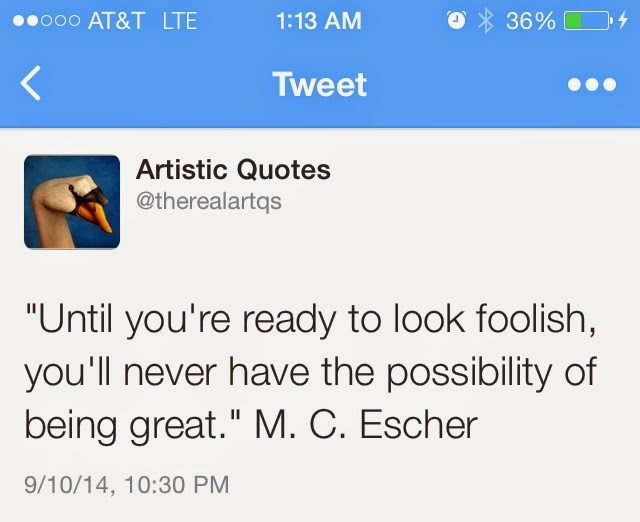 | |
| A movement from my ballet, Distinct Perceptions, inspired by a friend sharing about his severe OCD on Facebook (Dancer: Jackie McConnell - Photo: Dave Friedman) |
My partner and I have this very specific conversation pretty regularly. "Did you see what Jimmy-Jam wrote on Facebook yesterday?" "Of course I did! How could you miss something like that?" "I can't believe that they would post that for the public to see!" "Well, how is that any different than what I post online?" "It's not...I could never do something like that! I like my privacy..." And that is how it goes. Every day, some people feel the temptation to post anything from their dance movements to their bowel movements, while others will barely share an ounce of their happiest pleasures. When somebody shares information that is socially acceptable, usually something positive (only once or twice though without appearing egotistical) or something mundane, most people move on without mentioning a word. But if somebody posts their lowest point, their biggest vice, their most embarrassing moment, or their struggles, they are often met with uncomfortable opposition or the socially appropriate cold shoulder (with whispers abound). I am definitely an over-sharer when it comes to my online presence. And while it has benefited me and hurt me, at times, I continue to share my thoughts, my lessons, and my life for friends and strangers to read. Why?
Let's start off here. I am a performer. A majority of my life, I have put myself out there on a stage. Sometimes, I get to play myself. Other times, I get to play a character. As a ballet dancer, one thing I rarely get to have is a voice. In the studio, dancers are generally told what to do. On the stage, a dancer doesn't get to tell the audience how they are feeling, what choices they've made, or what decisions were made for them. Beyond that, dancers are judged by their bodies, their strength, and their physical intuition. Rarely their mind.
When I first started blogging on Myspace, I guess I just wanted an outlet. I had just moved to a brand new city 3,000 miles away from home. I had very few friends and very few outlets. If I wanted to express myself, there weren't many people with whom I could openly discuss and assess my new-found adulthood. At the ripe old age of 20, I started using social media. It was almost like having a conversation with somebody who was a really good listener. On top of that, it was kind of like a mini-stage where I could present a performance. But that performance was my reality, my inner thinking, and my real-life personality. Having that outlet made me feel relevantly normal. I could share simple personal things with whomever felt like listening. And since very few actual people wanted to listen at the time, it filled the void and relieved the stress of being somewhere foreign with little support.
 |
| I'd take photos when I felt lonely in Seattle - Elliott Bay |
After nearly a year of blogging, I made my first big social media mistake. After a really bad break-up with my first love, an attempt of friends to get us together to potentially reconcile, and another friend dabbing my fresh wounds with bounds of alcohol, I posted a nasty attack towards my former love. It was probably about 3 AM in the morning and by the time I had woken up nearly 6 hours later, that post had been read well over 100 times. I immediately deleted the post and felt ashamed for letting myself stoop to that level. It's the only post I've ever deleted. I learned a lot from that error. But I didn't stop approaching my public posting from the most honest and open place I possibly could.
Over time, I have had a handful of experiences that have been affected by my social media presence. I find that people are initially excited by my postings. It lets them have a better idea of who I am as a person without really knowing me at all. I also find that companies love it when you post something positive. Like, "Such an inspiring day working in the studio today." But, the moment that things start to go negative, the formerly projected excitement turns into disdainful judgement.
When I hurt my back in 2012 and was having a rough week in the studio with a choreographer who was treating me badly, I wrote a single sentence update about how lost I was feeling. A few days later, my boss (who had previously lauded my social media presence) pulled me aside and said, "You need to watch what you post online. Everybody knows that you are talking about us." The funny thing was that I mentioned no names, mentioned nothing of work, mentioned nothing of my injury. I was just feeling lost. But the second that there wasnt a big :-D on my Facebook, I was committing a foul act.
 |
| Sometimes, life is stormy - Mount Baldy, Alaska - 9/21/14 |
What living a publicly present social life comes down to is that sentence in the above paragraph, "People are moved by people." Why should someone share what they are experiencing? Because it moves people to feel, it moves people to think, it moves people to act. Sometimes life is amazing. And sometimes, life just downright hurts. Sometimes, your boss makes you feel horrible. Sometimes, your organization gives you an award for being an upstanding employee. By reacting to life publicly, people are offering a real life cinema across the widest web of the world. And there really isn't anything wrong with that as long as you are willing to be open to the judgements, positive and negative, of all of those that interact in your web.




